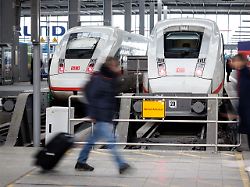Weselsky misses the last train
Bahn fails again in court: GDL strike takes place
January 9, 2024, 7:53 p.m
Listen to article
This audio version was artificially generated. More info | Send feedback
The announced train driver strike cannot be stopped legally: the Hessian State Labor Court rejects an urgent application from Deutsche Bahn, thus clearing the way for the work stoppage. One of the first to be affected by the train cancellations is GDL boss Weselsky.
The strike by the train drivers’ union GDL is taking place as planned. The Hessian State Labor Court in Frankfurt rejected an application from Deutsche Bahn for an interim injunction against the strike. Rail customers have to prepare for numerous train cancellations and delays up to and including Friday.
The GDL started its strike action at DB this Tuesday at 6 p.m. In passenger transport, the strike is scheduled to begin at 2 a.m. early Wednesday morning. The planned end of the industrial action is Friday evening at 6 p.m. But the effects are also likely to be felt in the hours before and after.
One of the first to be hit was GDL boss Claus Weselsky himself: “The last train is gone,” said the trade unionist after the verdict was announced. He now has to find other ways to get to Berlin in order to lead the train drivers’ strike there on Wednesday.
In the first instance, the Frankfurt Labor Court had already rejected an interim injunction from the railways and Transdev on Monday evening and allowed the strike. The DB did not succeed in its argument that the GDL had lost its ability to negotiate collective agreements after the temporary workers’ cooperative “Fair Train” was founded. This examination was not possible in an expedited procedure, said the presiding judge Michael Horcher.
Bahn sharply criticizes GDL
Deutsche Bahn called on the GDL to continue negotiations. The GDL must “finally take the path of compromise,” said the federally owned company in Berlin. “The GDL wants to enforce its demands one-on-one, otherwise it will go on strike. But that’s not how collective bargaining works,” said Florian Weh, general manager of the DB employers’ association AGV MOVE. “We have moved, now it is the GDL’s turn.”
Deutsche Bahn assumes that the train drivers’ strike will affect millions of customers this week. The company already has one Emergency timetable drawn up, which has been available online since Monday afternoon. Passengers can find out more about their journey there now or via a specially set up free phone number (08000 996633).
Train drivers demand reduction in working hours
During the GDL’s two previous warning strikes last year, around 80 percent of all long-distance trains were canceled. In regional transport, the effects were also far-reaching, but distributed very differently regionally. Experience has shown that many employees are organized by the GDL, especially in the eastern German states and the southwest.
Since the beginning of November, the GDL has been fighting with the railways and other railway companies for higher tariffs. The core of the current collective bargaining dispute is the union’s demand for a reduction in weekly working hours for shift workers from 38 to 35 hours. The railway considers this requirement to be unfulfillable. She is only willing to talk to the union about expanding existing working time models.
In the current tariff dispute, the GDL has already called for warning strikes twice, but these lasted a maximum of 24 hours in passenger transport. In December, the union let its members vote on indefinite strikes. Around 97 percent of participants were in favor of this. Since then, longer strikes have been possible.
